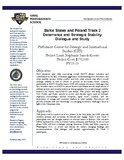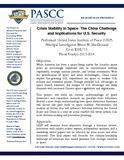Baltic States and Poland Track 2 Deterrence and Strategic Stability Dialogue and Study
| dc.contributor.author | Center on Contemporary Conflict | |
| dc.contributor.author | Sanok-Kostro, Stephanie | |
| dc.date.accessioned | 2015-06-17T22:29:48Z | |
| dc.date.available | 2015-06-17T22:29:48Z | |
| dc.date.issued | 2015-05 | |
| dc.identifier.uri | https://hdl.handle.net/10945/45433 | |
| dc.description | Performer: Center for Strategic and International Studies (CSIS) Project Lead: Stephanie Sanok-Kostro Project Cost: $175,000 FY15-16 | en_US |
| dc.description.abstract | Objective: New questions arise daily concerning overall NATO alliance cohesion and commitment in the face of Russian aggression. Understanding how deterrence and crisis stability operate within conflict and how crisis actions may affect overall strategic stability is vital to efforts to prevent or de-escalate future tensions, particularly in NATO frontline states. CSIS will examine deterrence challenges that face frontline states on NATO’s eastern border with Russia and the implications of military posture and security matters in that geography for overall strategic stability between the United States/NATO and Russia. This project will bring together U.S., Polish, and Baltic experts to review and discuss topics such as forwarddeployed, non-strategic nuclear weapons, “gray zone” conflicts, and the importance of energy and economic markets to crisis stability. This project will provide scholars with new knowledge on emerging deterrence challenges faced in light of the Ukrainian crisis. | en_US |
| dc.description.sponsorship | PASCC | en_US |
| dc.language.iso | en_US | |
| dc.publisher | Monterey, California: Naval Postgraduate School | en_US |
| dc.title | Baltic States and Poland Track 2 Deterrence and Strategic Stability Dialogue and Study | en_US |
| dc.type | Report | en_US |





